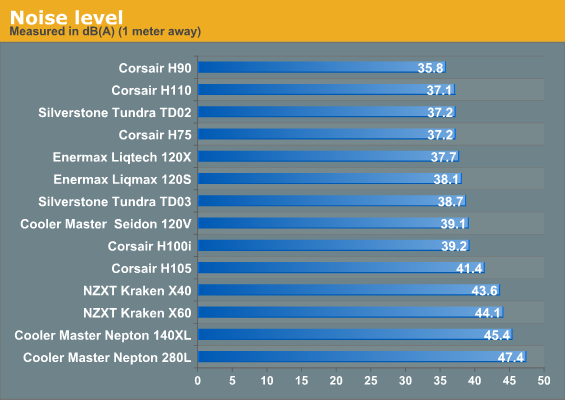Closed Loop AIO Liquid Coolers: 14-way Mega Roundup Review
by E. Fylladitakis on February 12, 2014 7:00 AM ESTTesting Results, Low Fan Speed (7V)









After dropping the voltage of the fans down to 7V, the characteristic performance of several AIO coolers changes quite a bit. As expected, the performance gap between most single and dual fan radiator models widens, as the larger surface maintains a greater heat dissipation rate as the flow rate decreases. The charts are once again led by Cooler Master's Nepton coolers, although that hardly qualifies as "low noise testing" as both coolers still generate high noise levels and are most definitely unsuitable for a low noise environment.
Corsair's H110 displays tremendous thermal performance under very heavy load, in conjunction with very low noise levels. NZXT's Kraken X60 delivers about the same thermal performance, which was to be expected as it virtually is the same design, yet the noise levels are significantly higher; apparently, Corsair chose their fans a bit more wisely (or they just got lucky). Silverstone's Tundra TD02 also fares considerably better this time, rivaling the high load thermal performance of all other 240mm coolers at considerably lower noise levels. Under low thermal loads, the Tundra TD02 manages to outperform most of the dual 120mm and 140mm coolers. Apparently, the large and thick radiator of the TD02 allows it to maintain high performance figures even when the airflow is reduced.
Those who are interested only in noiseless operation and are looking at AIO coolers as a high-performance, low noise alternative to CPU coolers should be careful with their selections. It is not always possible to reduce the speed of the stock fans or replace them in order to reduce the noise generated by the kit. For example, the fan of the Cooler Master Seidon 120V is virtually noiseless when its voltage is dropped down to 7V; the pump however is not, making a clearly audible, high pitch noise. This is also true for the Enermax Liqmax 120S, as the pump of this kit makes a whining noise as well, although the noise of its pump is significantly lower. On the other hand, the Corsair H90 is not the best performing or, due to its size, the most convenient kit of the roundup, yet it is entirely silent when its fan's voltage is reduced down to 7 Volts.










139 Comments
View All Comments
piroroadkill - Wednesday, February 12, 2014 - link
This is great, but where's at least a couple of air coolers in there for reference?I'd recommend the ever popular and classic Noctua NH-D14 since it's a widely reviewed, well known reference point.
piroroadkill - Wednesday, February 12, 2014 - link
If only I could edit my reply. I see that there is a category in Bench for CPU coolers. Never mind!ddriver - Wednesday, February 12, 2014 - link
It would still be a good idea to include a few high performance air coolers to compare how they do against the low end h2o coolers.just4U - Thursday, February 13, 2014 - link
Or even a Coolermaster 212 which is pretty much the go-to HSF for standard builds due to cost/cooling performance.MrSpadge - Wednesday, February 12, 2014 - link
Agreed - one standard high performance air cooler for ~50€ would suffice, but not including any feels incomplete.jmke - Wednesday, February 12, 2014 - link
so true, would have been a very good idea to throw in a €20 and €50 air cooler, using one of the 120mm fans to see how these water coolers compare.jmke - Wednesday, February 12, 2014 - link
best performance/noise CPU coolers is the Noctua in their charts. One of the best AIO is the NZXT Kraken X60. Let's see how they stack up:Noctua NH-U14S (2 Fans 100%) 43.1°C / 33.3 dBA / €70
NZXT Kraken X60 (Silent) 41.2°C / 30.5 dBA / €140
is a few °C difference worth an extra €70? is a HSF worth €70?
how important is CPU temperature?
if you don't overclock, keeping CPU temp below max would suffice...
mr_tawan - Wednesday, February 12, 2014 - link
Personally I use closed-loop water cooler(corsair H60) because the large air cooler I used (CM Hyper212) gets in the way of ram modules (people with intel chip does not suffer from this, AFAIK). With water cooler, I can put 4 DIMM on the mainboard without any problems.In my system, there is no significant differences between these two cooler. Water cooler is a little bit louder, btw.
Idonno - Saturday, December 6, 2014 - link
I agree 100%. Plus the sheer weight (on the MB and CPU) and size that an air cooler like the Noctua NH-U14S has to be to be even remotely competitive is absolutely ridiculous.It's not just the better temps that closed loop water coolers provide, it's convenience, accessibility, less strain on critical components and better temps.
All-in-all the higher cost of closed loop water coolers is IMO worth every penny.
E.Fyll - Wednesday, February 12, 2014 - link
Unfortunately, the few air coolers that I still have in my house are outdated. Yet, there will be many air cooler reviews and roundups coming in the near future, with their results directly comparable to those of this review. :)